This story is one of several “Stories of Change” highlighted in a new evaluation of ARC’s POWER Initiative.
With support from a Trade Adjustment Assistance Community College and Career Training (TAACCCT) grant, ShaleNET—a consortium led by Westmoreland County Community College—launched an entry-level training program for high-demand upstream occupations. By the close of the first ShaleNET grant in 2013, the program had trained and helped over 3,400 students find employment. In 2017, a group of visionaries gathered to strategize on how to build on the success of ShaleNET. The ShaleNET Program is a unique partnership between employers in the energy sector and a consortium of colleges in Ohio, Pennsylvania, and West Virginia.
With seed funding from the Benedum Foundation, the Tristate Energy and Advanced Manufacturing (TEAM) Consortium was launched. The TEAM Consortium began with 49 public and private partners, all rallied around improving the outcomes of students and workers in a region impacted by job and population losses as result of an economy transitioning away from coal. With support from the Benedum Foundation and Consortium co-chairs Chevron and the Community College of Beaver County, the “TEAMing Up to Build Pathways to Jobs” project received a POWER Initiative grant in 2018 to create clear and accessible education and career pathways through training programs and a new public portal with information about and referrals to those programs.
Community between Colleges
Within two years, nine community colleges across the three-state footprint agreed to common curricula for a wide array of courses and signed a Memorandum of Understanding (MOU) to maximize the transfer of credits for those courses. TEAM also launched a new website, www.connect2team.org, with information about occupations and training programs to help folks connect to TEAM partners.
To date, the project has served over 3,100 students and over 8,200 worker trainees. Not only this, but thanks to this ARC POWER grant, 600 jobs have been created and 120 participating businesses have been improved.
TEAM is an ideal model for what unique partnerships are capable of. Through their collaboration of educators, workforce and economic development organizations, state and federal agencies, and private industry, students and workers are connected with the training they need to get in-demand jobs and help strengthen the growing regional economy.



